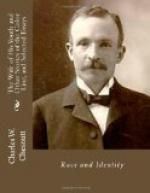Under these circumstances, Mrs. Braboy was left a good deal to her own company. Owing to lack of opportunity in early life, she was not a woman of many resources, either mental or moral. It is therefore not strange that, in order to relieve her loneliness, she should occasionally have recourse to a glass of beer, and, as the habit grew upon her, to still stronger stimulants. Uncle Wellington himself was no tee-totaler, and did not interpose any objection so long as she kept her potations within reasonable limits, and was apparently none the worse for them; indeed, he sometimes joined her in a glass. On one of these occasions he drank a little too much, and, while driving the ladies of Mr. Todd’s family to the opera, ran against a lamp-post and overturned the carriage, to the serious discomposure of the ladies’ nerves, and at the cost of his situation.
A coachman discharged under such circumstances is not in the best position for procuring employment at his calling, and uncle Wellington, under the pressure of need, was obliged to seek some other means of livelihood. At the suggestion of his friend Mr. Johnson, he bought a whitewash brush, a peck of lime, a couple of pails, and a hand-cart, and began work as a whitewasher. His first efforts were very crude, and for a while he lost a customer in every person he worked for. He nevertheless managed to pick up a living during the spring and summer months, and to support his wife and himself in comparative comfort.
The approach of winter put an end to the whitewashing season, and left uncle Wellington dependent for support upon occasional jobs of unskilled labor. The income derived from these was very uncertain, and Mrs. Braboy was at length driven, by stress of circumstances, to the washtub, that last refuge of honest, able-bodied poverty, in all countries where the use of clothing is conventional.
The last state of uncle Wellington was now worse than the first. Under the soft firmness of aunt Milly’s rule, he had not been required to do a great deal of work, prompt and cheerful obedience being chiefly what was expected of him. But matters were very different here. He had not only to bring in the coal and water, but to rub the clothes and turn the wringer, and to humiliate himself before the public by emptying the tubs and hanging out the wash in full view of the neighbors; and he had to deliver the clothes when laundered.
At times Wellington found himself wondering if his second marriage had been a wise one. Other circumstances combined to change in some degree his once rose-colored conception of life at the North. He had believed that all men were equal in this favored locality, but he discovered more degrees of inequality than he had ever perceived at the South. A colored man might be as good as a white man in theory, but neither of them was of any special consequence without money, or talent, or position. Uncle Wellington found a great many privileges open to him at the North,




